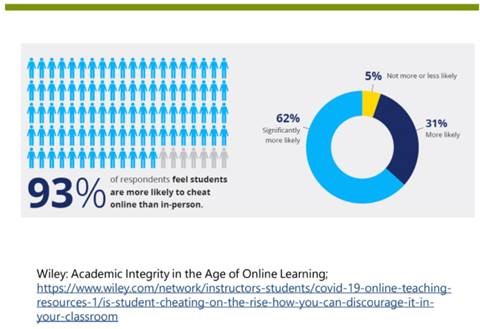Innovative Educator Training
Summary
Reduce Cheating In The Online Classroom: Shifting From Punishment to Prevention
Jean’s research focus is on enhancing student learning in the online classroom through innovative assessment strategies. Strategies, philosophies, techniques not to catch cheaters, but to change the environment so as to reduce the temptation to cheat.
- A recent Wiley study asked – “Do you think students are more likely to cheat online than in person?” — sad reality is 93% believe they are.
- When they ask students – they feel it is not even close — about 95% of students think it is equally likely in both places.
- Faculty believe it is more prevalent online is because we can see them, what they are doing or using.
- If we don’t change how we teach, we will constantly battle – how do we see what they are doing; how do we verify their identify, tighten down
- The reality is it has nothing to do with tightening down controls — it is about teaching better.
- Face 2 Face we get a good sense of who is doing well.
- So it may be as much about us as it is about the students.
- Research clearly shows us students don’t really want to cheat. They never enter the classroom saying “I hope I feel the pressure that I want to cheat.”
But they become stressed and overwhelmed in an academic environment. And then it becomes easier to cheat than to do the hard work of learning.
“They are ruthlessly efficient”
Inside Higher ED
Best Way to Stop Cheating in Online Courses? ‘Teach Better’
Summary
The research is all about us reframing the learning environment, making it a supportive environment – and reducing the temptation to cheat.
Key is to reduce the motivation to cheat. Make them feel less stressed. Connect them to us, to their peers, to their materials and the learning experience. Reduce their unsure of what you want. Scaffold their assignments, give them the foundation for success. Give them the feedback and guidance so they are able to succeed. Reduce time spent on reducing cheating, and increase time teaching.
The key is to create a learning environment that reduces their motivation to cheat.
Projects / tests that account for a huge percentage of their grade creates a high pressure situation, stresses them out, and increases likelihood of cheating. Years of research show students will prioritize getting a good grade over learning. Even in hands on skills, foundational courses.
So have to start with creating a culture of learning – where students feel they are an integral part of the teaching and learning dynamic.
Lowering the Punishment = Raising the Prevention



